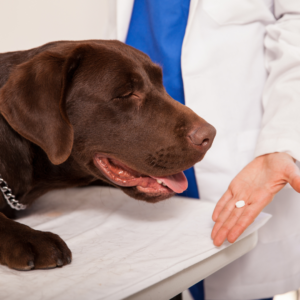
Taking An In-Depth Look At Heartworms, How They Affect Pets, And How To Prevent Them In Honor Of National Heartworm Awareness Month
As pet owners, we often go to great lengths to ensure the health and happiness of our furry companions. We schedule regular vet check-ups, feed them nutritious diets, and provide ample exercise and love. However, there’s one threat that often goes unnoticed until it’s too late: heartworm disease.
April is National Heartworm Awareness Month. This awareness-based holiday is dedicated to educating pet owners about the dangers of heartworms and the importance of prevention. In honor of National Heartworm Awareness Month, this article will discuss everything you need to know about heartworms. This includes what they are, how pets get them, and how to prevent them.

What Exactly Are Heartworms?
Heartworm disease is a serious and potentially fatal condition caused by parasitic worms. According to The American Heartworm Society, they live in the arteries of the lungs, heart, and surrounding organs. Heartworms affect dogs, cats, and other species of mammals, including wolves, foxes, ferrets, sea lions, and (in rare instances) humans.
How Do Pets Get Heartworms?
According to VCA Animal Hospitals, heartworms are transmitted through the bite of an infected mosquito. When a mosquito carrying heartworm larvae bites a pet, the larvae are deposited onto the animal’s skin and enter the bloodstream through the bite wound. Over the course of several months, the larvae mature into adult worms, lodging themselves in the heart, lungs, and surrounding blood vessels. Here they can cause severe damage and potentially lead to death if left untreated.
Heartworm Disease Symptoms
The symptoms of heartworm disease can be subtle and easily overlooked, especially in the early stages. Some common signs include coughing, difficulty breathing, lethargy, reduced appetite, and weight loss. As the disease progresses, pets may develop a swollen belly due to fluid accumulation, fainting episodes, and even sudden collapse. In cats, the symptoms can be even more nonspecific, ranging from mild coughing to sudden death.
Unfortunately, by the time symptoms become apparent, the disease has often reached an advanced stage, making treatment more challenging and costly. Treatment typically involves a series of injections to kill adult worms, along with strict rest and monitoring. However, treatment can be risky, and complications may arise, especially in cases where the disease has caused significant damage to the heart and lungs.

Heartworm Prevention Medications
Prevention is key when it comes to protecting our pets from heartworm disease. Thankfully, there are safe and effective preventatives available in the form of monthly oral medications, topical treatments, and injectable formulations. These preventatives work by killing the immature larvae before they have a chance to develop into adult worms, effectively breaking the transmission cycle. For more information about heartworm prevention medications, click here.
Mosquito Exposure Control
In addition to administering preventatives, pet owners should also take steps to reduce their pets’ exposure to mosquitoes. This may include using mosquito repellents designed specifically for pets, keeping them indoors during peak mosquito activity times, and eliminating standing water around the home where mosquitoes breed. For more information about pet-safe mosquito repellents, click here.

Routine Veterinarian Checkups
Lastly, routine check-ups with your veterinarian are essential for early detection of heartworm infection. Annual heartworm tests are recommended for all dogs, even those receiving preventive medication. Catching heartworms early can save your pet from a lot of pain and organ damage. Talk to your veterinarian about heartworm tests and how often your pets should be tested for them.
Hire A Pet Sitter/Dog Walker Today!
If you or someone you know is looking for a pet sitter or dog walker, then look no further than My Dog Walker & Pet Sitting. We are fully insured & bonded and have over 10 years of experience working with animals. Click here to check out our wide variety of pet sitting services including in-home pet sitting and routine dog walking.
We currently service the Medford, Medford Lakes, Shamong, and Tabernacle, NJ areas. To become a client, click here or give us a call at 856-217-2781. Be sure to check us out on Facebook and Instagram too! We post new content regularly, so be sure to follow us so you don’t miss out on adorable pictures of our pets.
